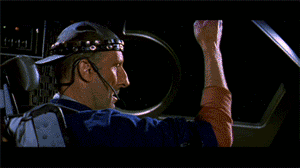I know, I'm not debating you. I'm asking how you view it out of curiosity. You place so much emphasis on original intention of the author that you disregard other interpretations even if they make far more sense. So I'm asking, when part 1 of something is made with 1 intention and part 2 is made with another, yet you still have to consider the story as a whole, what do you make of it if ONLY the authors intentions that went into making that matter?
But the problem is we view evidence for what makes sense with two different lens. If I take into account the author's intention and the context of its creation as evidence for whether an interpretation makes sense, you'd say that's not how you're supposed to do it and it doesn't count, I would say it does. I'm not saying only the author's intent matters, but that it doesn't not matter.
To your point though, you don't have to view the story as a whole any more than the 6 Star Wars movies are one story and not six individual movies. Is the real Star Wars story all 6 chronologically or two trilogies, 4-6 and then 1-3. Is the real video game the one with DLC or the one without? I don't know if I, or anyone, can give definitive answers to those kind of questions, but we can debate and talk about it. We can evaluate the product we are given, and reevaluate as the product changes.
So let's say Bioware adds post-game DLC that makes the ending different. It doesn't change what the original product was, and it doesn't change their state of mind and past intentions when creating it. They may have changed their mind as a result of fan reaction or they saw a financial opportunity to exploit, but that doesn't retroactively alter their past, it creates a new future thing we can evaluate.
So the previous game may have one ending, and this new dlc creates another. It would be similar but not analogous to my Blade Runner example. In that case Ridley Scott had a vision for the film, but it was not what the theatrical release was. He later gave out his Director's Cut which represented the film he wanted to release. In this case, we're seeing what the film was originally intended to be, but it still doesn't erase the original.
This is not the same in Bioware's case, they had their original intent and the ending was as given. If they do new ending DLC to placate fans or exploit a financial possibility, we're seeing a new thing, but the change is due in response to something and doesn't represent the original/intended ending (unless they admit they had the DLC planned from the start, but that would entail taking into account the author's intent).





